This post accepts webmentions. Do you have the URL to your post?
You may also leave an anonymous comment. All comments are moderated.
This post accepts webmentions. Do you have the URL to your post?
You may also leave an anonymous comment. All comments are moderated.

I think the idea behind Blog Snoop is solid—I mean you’re just talking about trying to define the edges of a certain community. I’m sufficiently convinced now (between Reddit wikis and ‘awesome lists’) that directories still serve this purpose. Find The Others.
I guess part of the problem is—what is the community? Bloggers? The Indieweb? The subset of the Indieweb that wants to talk about discovery? (Search, directories, blogrolls, etc.) I think you are shooting for larger than the Indieweb—bloggers, in general, right? That operate independently? So, do Medium blogs count?
Ok, so, the usability of the directory is central. This makes sense: a directory is a practical instrument. It needs to be elegant and tight. Using a blog as a directory is very novel and very convenient—and it can work! But I think the directory itself needs to be incredibly sweet to use: full of great stuff, well-organized and fun to use, if possible. I think you have to really want to visit the directory regularly.
Google won by distilling everything down to one box. It was actually fun to use Google because you could start typing and it would try to finish your sentence for you. Which I actually think more people enjoyed for its novelty than its usefulness. And it was useful, too!
So a few starter suggestions:
I am working on a personal directory right now, so my attention is there. But maybe if we keep talking about this, we can figure it out. Don’t give up—just keep talking and refining.
You’ve actually given me a great idea (I think it might be ‘great’, who knows) for Indieweb.xyz. I think I’m going to make a directory of the sites that submit to it. And it will also show the sub (‘tag’) that they most commonly submit to. It would be a simple change and might help me gradually collect links to blogs that I can go through over time.
Good luck, Brad! These tiny efforts may seem small in the face of massive social empires out there, but I think there are many people who are (or will) participate if they can just be found.
This post accepts webmentions. Do you have the URL to your post?
You may also leave an anonymous comment. All comments are moderated.

Ok, yeah—this will be essential. I wonder if I can use the page’s title tag for this? Like: save the title tag the first time I check the site. Because it’s much less rare for the title tag to change than the body text.
I like the idea of the webring code. I just don’t have any influence on some of the sites that I am linking to. But yeah: mixing webrings and Indieweb.xyz is interesting.
As for the size of a directory (or webring), that is such a big problem on the Web. They need to have upper limits, for sure. If it gets too big, it feels (and does become) unusable. If it’s too large, then nothing in it is special. Like with these “awesome lists”—you are led to believe that the list is a severe abridgement, because the links in it are truly impressive.
With webrings, someone is special by virtue of discovering the ring first. So I can see closing admittance. I’m not that into webrings because it’s a pretty fragile link between all parties.
I’d like linking to take some effort, which also limits the amount of links you can have and makes them more potent.
Thanks for the ideas! Great stuff.
This post accepts webmentions. Do you have the URL to your post?
You may also leave an anonymous comment. All comments are moderated.

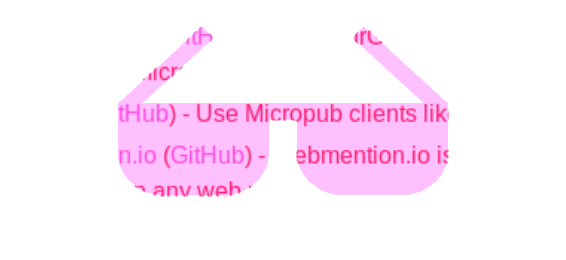
Continuing my discussion from Foundations of a Tiny Directory, I discuss the recent trend in ‘awesome’ directories.
All this recent discussion about link directories and one of the biggest innovations was sitting under my nose! The awesome-style directory, which I was reminded of by the Dat Project’s Awesome list.
An “awesome” list is—well, it isn’t described very well on the about page, which simply says: only awesome is awesome. I think the description here is a bit better:
Curated lists of awesome links around a specific topic.
The “awesome” part to me: these independently-managed directories are then brought together into a single, larger directory. Both at the master repo and at stylized versions of the master repo, such as AwesomeSearch.
In a way, there’s nothing more to say. You create a list of links. Make sure they are all awesome. Organize them under subtopics. And, for extra credit, write a sentence about each one.
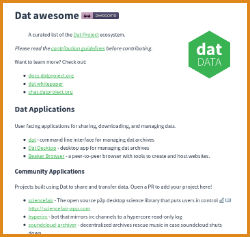
Generally, awesome lists are hosted on Github. They are plain Markdown READMEs.
They use h2 and h3 headers for topics; ul tags for the link lists. They are
unstyled, reminiscent of a wiki.
This plain presentation is possibly to its benefit—you don’t stare at the directory, you move through it. It’s a conduit, designed to take you to the awesome things.
Awesome lists do not use tags; they are hierarchical. But they never nest too deeply. (Take the Testing Frameworks section under the JavaScript awesome list—it has a second level with topics like Frameworks annd Coverage.)
Sometimes the actual ul list of links will go down three or four levels.
But they’ve solved one of the major problems with hierarchical directories: needing to click too much to get down through the levels. The entire list is displayed on a single page. This is great.
The emphasis on “awesome” implies that this is not just a complete directory of the world’s links—just a list of those the editor finds value in. It also means that, in defense of each link, there’s usually a bit of explanatory text for that link. I think this is great too!!
The reason why most awesome lists use Github is because it allows people to submit links to the directory without having direct access to modify it. To submit, you make a copy of the directory, make your changes, then send back a pull request. The JavaScript awesome list has received 477 pull requests, with 224 approved for inclusion.
So this is starting to seem like a rebirth of the old “expert” pages (on sites like About.com). Except that there is no photo or bio of the expert.
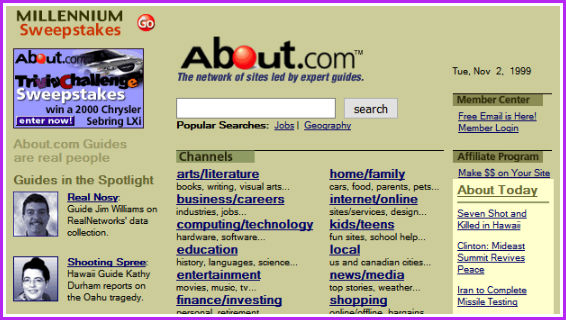
As I’ve been browsing these lists, I’m starting to see that there is a wide variety of quality. In fact, one of the worst lists is the master list!! (It’s also the most difficult list to curate.)
I also think the lack of styling can be a detriment to these lists. Compare the Static Web Site awesome list with staticgen.com. The awesome list is definitely easier to scan. But the rich metadata gathered by the StaticGen site can be very helpful! Not the Twitter follower count—that is pointless. But it is interesting to see the popularity, because that can be very helpful sign of the community’s robustness around that software.
Anyway, I’m interested to see how these sites survive linkrot. I have a feeling we’re going to be left with a whole lot of broken awesome lists. But they’ve been very successful in bringing back small, niche directories. So perhaps we can expect some further innovations.
This post accepts webmentions. Do you have the URL to your post?
You may also leave an anonymous comment. All comments are moderated.

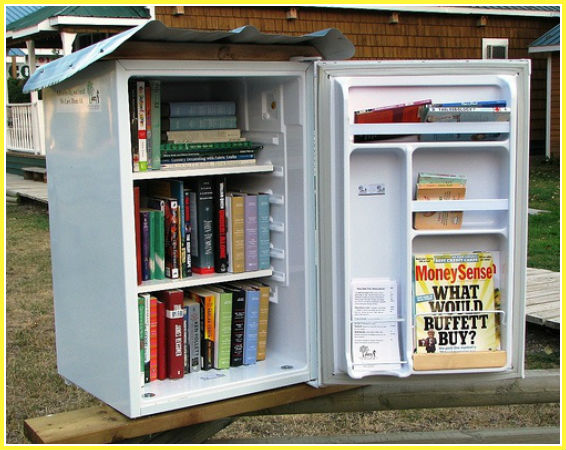
Can the failing, impotent web directory be transformed? Be innovated??
Can we still innovate on the humble web directory? I don’t think you can view large human-edited directories (like Yahoo! or DMOZ) as anything but a failure when compared to Google. Sure, they contained millions of links and, ultimately, that may be all that matters. But a human editor cannot keep up with a Googlebot! So Google’s efficiency, speed and exhaustiveness won out.
But perhaps there is just no comparison. Perhaps the human-edited directory still has its strengths, its charms. After all, it has a human, not a GoogleBot. Could a human be a good thing to have?
We now have an abundance of blogs, news, podcasts, wikis—we have way too much really. Links constantly materialize before your very eyes. Who would even begin, in 2018, to click on Yahoo!'s “Social Science” header and plumb its depths?
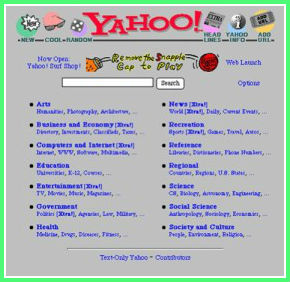
Strangely enough, even Wikipedia has a full directory of itself, tucked in a corner. (Even better, there’s a human-edited one hidden in there! Edit: Whoa! And the vital articles page!) These massive directories are totally overwhelming and, thus, become more of an oddity for taking a stroll. (But even that—one usually begins a stroll through Wikipedia with a Google search, don’t they?)
The all-encompassing directory found another way: through link-sharing sites like Del.icio.us and Pinboard. If I visit Pinboard’s botany tag, I can see the latest links—plant of the week the “Night Blooming Cereus” and photos of Mount Ka’ala in Hawaii. Was that what I was looking for? Well at least I didn’t have to find my way through a giant hierarchy.
Where directories have truly found their places is in small topic-based communities. Creepypasta and fan site wikis have kept the directory alive. Although, hold up—much like Reddit’s sub-based wikis—these mostly store their own content. The Boushh page mostly links back to the wiki itself, not to the myriad of essay, fan arts and video cosplays that must exist for this squeaky bounty hunter.
Besides—what if a directory wasn’t topic-based? What if, like Yahoo!, the directory attempted to tackle the Whole Web, but from a specific viewpoint?
You see this in bookstores: staff recommendations. This is the store’s window into an infinite catalog of books. And it works. The system is: here are our favorites. Then, venturing further into the store: this is what we happen to have.
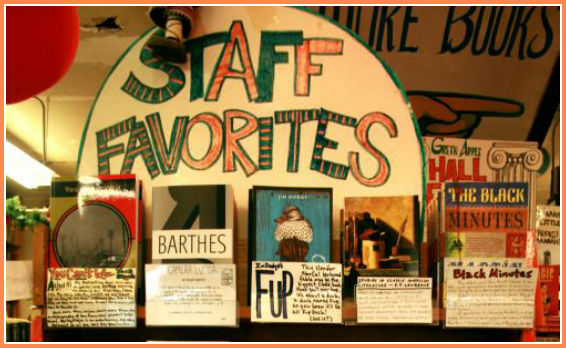
“But I want what I want,” you mutter to yourself as you disgustedly flip through a chapbook reeking of hipster.
Well, of course. You’re not familiar with this store. But when I visit Green Apple in San Francisco, I know the store. I trust the store. I want to look through its directory.
This has manifested itself in simple ways like the blogroll. Two good examples would be the Linkage page on Fogus.me, which gives short summaries, reminiscent of the brief index cards with frantic marker all over them. This is the staff recommendation style blogroll.
Another variation would be Colin Walker’s Directory, which collects all blogs that have sent a Webmention[1]. This serves a type of “neighborhood” directory.[2]
What I want to explore now is the possibility of expanding the blogroll into a new kind of directory.
Likes, upvotes, replies, friending. What if it’s all just linking? In fact, what if linking is actually more meaningful!
When I friend you and you disappear into the number twenty-three—my small collection of twenty-three friends—you are but a generic human, a friendly one, maybe with a tiny picture of you holding a fishing rod. With any luck, the little avatar is big enough that I can discern the fishing rod, because otherwise, you’re just a friendly human. And I’m not going to even attempt to assign a pronoun with a pic that small.
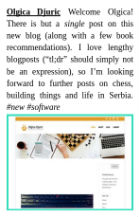
It’s time for me to repeat this phrase: Social Linking. Yes, I think it could be a movement! Just a small one between you and I.
It began with an ‘href hunt’: simply asking anyone out there for links and compiling an initial flat directory of these new friends. (Compare in your mind this kind of treatment of ‘friends’ to the raw name dumps we see on Facebook, et al.) How would you want to be linked to?
Now let’s turn to categories. A small directory doesn’t need a full-blown hierachy—the hierarchy shouldn’t dwarf the collection. But I want more than tags.
---
Link Title
url://something/something
*topic/subtopic format time-depth
Markdown-formatted *description* goes here.
Ok, consider the above categorization structure. I’m trying to be practical but multi-faceted.
topic/subtopic is a two-level ad-hoc categorization similar to a tag.
A blog may cover multiple categories, but I’m not sure if I’ll tackle that.
I’m actually thinking this answers the question, “Why do I visit this site?
What is it giving me?” So a category might be supernatural/ghosts if I go there
to get my fix of ghosts;
or, it could be writing/essays for a blog I visit to get a variety of longform.
An asterisk
would indicate that the blog is a current feature among this topic (and this
designation will change periodically.)format could be: ‘blog’, ‘podcast’, ‘homepage’, a single ‘pdf’ or ‘image’, etc.time-depth indicates the length one can expect to spend at this link. It could
be an image that only requires a single second. It could be a decade worth of blog
entries that is practically limitless.The other items: author, url and description—these are simply metadata that would be collected.
The directory would then allow discovery by any of these angles. You could go
down by topic or you could view by ‘time depth’. I may even nest these structures
so that you could find links that were of short time depth under supernatural/ghosts.
The key distinct between this directory and any other would be: this is not a collection of the “best” links on the Web—or anywhere near an exhaustive set of links. But simply my links that I have discovered and that I want to link to.
I don’t know why, but I think there is great promise here. Not in a return to the old ways. Just: if anyone is here on the Web, let’s discover them.
I should also mention that many of the realizations in this post are very similar to Brad’s own Human Edited vs. Google post, which I cite here as an indication that this topic is currently parallelized. ↩︎
This post accepts webmentions. Do you have the URL to your post?
You may also leave an anonymous comment. All comments are moderated.

Ok, a few folks out there let me link to them! Oh, I’m so excited! It’s strange how hard it is to ask a question out on the open Web and to get a reply. If you have any idea how I can find new, unusual personal home pages and blogs—please clue me in.
This post accepts webmentions. Do you have the URL to your post?
You may also leave an anonymous comment. All comments are moderated.

So, perhaps tags (or subreddit-style categories) are good for initial categorization and then a more detailed hierarchy is good for a competent editor. I also wonder: how did you track expired links? Changed links? Would you indicate that a story got an update?
Reddit has done a similar thing with wikis. By giving each subreddit a wiki, many are able to arrange a heirarchical directory of links. I guess I’m wondering if a wiki is a suitable replacement for a directory. Or if the only difference is having a crawler attached. (Which is a formidable difference.)
An idea I’ve had with Indieweb.xyz is to have users submit a finer-grained category using the u-category class. So they could submit:
<a href="https://indieweb.xyz/en/startrek" class="u-syndication u-category">
xyz/startrek: Photos: DS9: Nog</a>
And it would place it in the permanent hierarchical directory (which crawls links to keep them fresh.) It feels like some moderation would be needed. But I am trying to stay away from that.
I appreciate your thoughtful replies. I am starting to both see how directories are present in our modern incarnation of the Web and desire some innovation for them.
This post accepts webmentions. Do you have the URL to your post?
You may also leave an anonymous comment. All comments are moderated.

I am collecting links to anything, anyone. Non-commercial, non-software links. It’s become somewhat difficult to find my way out of my bubble. So I’m wondering if you can just tell me where you are.
This post accepts webmentions. Do you have the URL to your post?
You may also leave an anonymous comment. All comments are moderated.

tl;dr The demand for recency (Chronos!) obliterated the Web’s static directory—and the lowly home page. Strangely, the home page is still out there in plain view. But it has died as an art form.
In a way, portfolio/brochure-style home pages also killed home pages by stagnating the form. On the other hand, home pages are also very alive in the form of wikis (such as Creepypasta) and static directories like Know Your Meme.
I think the underlying appeal is a return to the Old Web. I don’t think this appeal is possible—we’ve moved on—but I think a more cohesive #DeleteFacebook and IndieWeb movement (hang on a sec, the IndieWeb is cohesive! get in here!) could help steer us. Related: Here’s my post discussing what we should take with us.
This post accepts webmentions. Do you have the URL to your post?
You may also leave an anonymous comment. All comments are moderated.

Fantastic. Yes! This is exactly the problem. It’s very difficult for a new participant to make headway because they simply get lost in the pile.
I think all of these approaches need to be reconsidered just like you’re doing, but I want to focus on directories—which are still very much in vogue, but are unrecognizable when compared to the old Yahoo. The big directories these days are Reddit and Pinterest. (And Wikipedia, like you say.) Delicious was one of these too. They are directories because they are topic-based catalogs of thought.
Niche directories exist in the form of stuff like Pinboard, Hacker News, Lobste.rs and so on. So, Hacker News acts basically like a directory of thought for its community. And the users there spend their time pruning and curating this directory.
All of these directories struggle with a sort of memory failure—no one really plumbs the archives of these sites—but that makes perfect sense given that the focus is on absolute recency. Part of the spectacular failure of Yahoo-style directories was due to no sense of recency (a heartbeat) on all those links.
The nice thing about Yahoo was that you could categorize yourself. Reddit, Pinterest, Pinboard—you have to wait for someone else to find you.
To your point about filter blogs: I think there used to be an answer here. It used to be that for topic-based technology blogs, much of their grassroots content came from mailing lists. Mailing lists used to be the primary announcement system for software. (If you look at technology blogs, they are much more commercial now.) So the mailing lists acted like a completely open submission system where you could safely self-promote. And then blogs skimmed their favorite stuff out of these. (IRC and web forums also acted as support systems here.)
So here’s what I’d like to see in a directory:
I am trying to accomplish some of this with my directory Indieweb.xyz, but I’m also not sure it will all work due to self-promotion having problems of its own—in addition to being a dirty word on its own.
At any rate, wonderful post. Thankyou!
This post accepts webmentions. Do you have the URL to your post?
You may also leave an anonymous comment. All comments are moderated.

glitchyowl, the future of 'people'.
jack & tals, hipster bait oracles.
maya.land, MAYA DOT LAND.
hypertext 2020 pals: h0p3 level 99 madman + ᛝ ᛝ ᛝ — lucid highly classified scribbles + consummate waifuist chameleon.
yesterweblings: sadness, snufkin, sprite, tonicfunk, siiiimon, shiloh.
surfpals: dang, robin sloan, marijn, nadia eghbal, elliott dot computer, laurel schwulst, subpixel.space (toby), things by j, gyford, also joe jenett (of linkport), brad enslen (of indieseek).
fond friends: jacky.wtf, fogknife, eli, tiv.today, j.greg, box vox, whimsy.space, caesar naples.
constantly: nathalie lawhead, 'web curios' AND waxy
indieweb: .xyz, c.rwr, boffosocko.
nostalgia: geocities.institute, bad cmd, ~jonbell.
true hackers: ccc.de, fffff.at, voja antonić, cnlohr, esoteric.codes.
chips: zeptobars, scargill, 41j.
neil c. "some..."
the world or cate le bon you pick.
all my other links are now at href.cool.
Reply: How Do You Find New/Interesting Blogs?
Mostly, similar to what coldbrain has said, I find blogs when they are casually mentioned on a blog or comment somewhere. Stuff like blogrolls and directories and such just don’t seem to exist. I know, because I’m constantly looking for them!
Now, these things do exist in the small enclave of the Indieweb. There is the Indieweb wiki, which has links all over it. And IndieNews, Indiemap, Blog Snoop and so on. But if I’m looking for blogs and websites that are out there—it’s impossible.
If I’m looking for a specific topic, I’ll Google “quilting blog” or I’ll look on Pinboard under the tag “chess”—and see what blogs come up.
But more often than not, I really want to read someone interesting. Someone’s stories and thoughts. To find all the great writers of our time that are out there. (Most writers I know that write in the literary tradition are lost as to where they should find readers now. It’s terribly ironic when you consider all the reading that is done on the Web in this age.)
This all excites me, though! It seems that there is still a frontier on the web. There is still a chasm to cross between all of us. We have a long way to go.
And I think that’s what drew me to the Indieweb. The answer will start here, in this group, because we’re thinking about it. I think about when Ward Cunningham came out with the wiki—it seemed like such a small, pointless invention. But what a masterstroke! What will be next?
Oh and one more thought about directories: I have a theory that exploring a directory is possibly not directly the best way to discover new things. They can be big and dry and tough to get through. I think they more directly benefit the builder of the directory and, also, those listed in the directory.
The builder of the directory explores and unearths other folks. They then leak into this person’s life in a myriad of ways. (For example, I began by simply linking to you once, in pursuit of new things, but now I follow you very closely.) The initial link begets more. Knotty, twisty—here I think of Sam Ruby’s word intertwingly—vines of links around each other.
And the recipient of the link is possibly motivated to build their own directory, so as to establish (or at least to not forget) their new network. So it can be viral. Blogrolls very much experienced this.